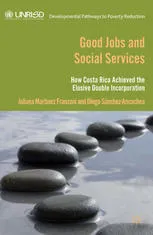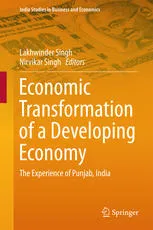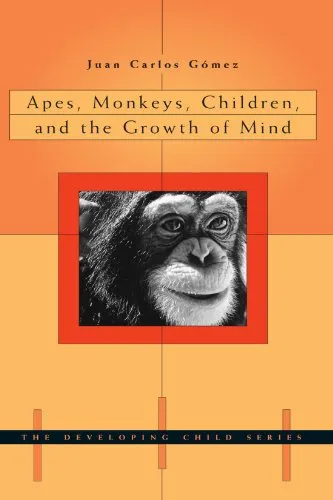Good Jobs and Social Services: How Costa Rica achieved the elusive double incorporation
4.5
بر اساس نظر کاربران

شما میتونید سوالاتتون در باره کتاب رو از هوش مصنوعیش بعد از ورود بپرسید
هر دانلود یا پرسش از هوش مصنوعی 2 امتیاز لازم دارد، برای بدست آوردن امتیاز رایگان، به صفحه ی راهنمای امتیازات سر بزنید و یک سری کار ارزشمند انجام بدینکتاب های مرتبط:
معرفی کتاب Good Jobs and Social Services: How Costa Rica achieved the elusive double incorporation
کتاب Good Jobs and Social Services به قلم جولیانا مارتینز فرانزونی و دیگو سانچز-آنکوشآ اثری قابلتوجه است که به بررسی چگونگی دستیابی کاستاریکا به ترکیب دوگانه موفقیت در بازار کار و خدمات اجتماعی میپردازد. این کتاب با تمرکز بر سیستمهای سیاستگذاری اجتماعی و ایجاد شغل در این کشور کوچک آمریکای لاتین، مسیری منحصربهفرد برای توسعه را معرفی میکند که میتواند الگویی برای دیگر کشورها باشد.
خلاصه مفصل کتاب
در این کتاب، نویسندگان تلاش کردهاند تا چرایی موفقیت کاستاریکا در مقایسه با بسیاری از کشورهای در حال توسعه مورد بررسی قرار گیرد. آنان مفهوم double incorporation را بهعنوان هدف اصلی، یعنی ترکیب ایجاد شغل مناسب در بازار کار (Good Jobs) با فراهمسازی خدمات اجتماعی فراگیر و جامع (Social Services) مورد تحلیل قرار میدهند. نویسندگان نشان میدهند که چگونه کاستاریکا با ظرفیت نهادی و تصمیمهای هوشمندانه دولت، توانسته است از چالشهایی همچون نابرابری، فقر و محدودیتهای ساختاری عبور کند.
آنچه این کتاب را ویژه میسازد، ترکیب پژوهش تاریخی با نگاه تحلیلی به سیاستهای اقتصادی، اجتماعی و کارایی سیستمهای رفاهی است. کاستاریکا از دهه های ۱۹۴۰ و ۱۹۵۰ به بعد، استراتژیهای کاربردی را برای فراهمکردن شغل و همزمان گسترش خدمات بهداشتی، آموزشی و تأمین اجتماعی اتخاذ کرده است. نویسندگان بر این باورند که این رویکرد جامع، رمز موفقیت این کشور در ایجاد جامعهای پایدار و عادلانه است.
نکات کلیدی
- مفهوم double incorporation بهعنوان هدف سیاستگذاری اجتماعی و اقتصادی.
- نقش دولت در تنظیم سیاستها و تضمین هماهنگی میان بخشهای مختلف اقتصادی و اجتماعی.
- اهمیت مشارکت جمعی و اولویتبندی عدالت اجتماعی در موفقیت پایدار.
- بررسی مقایسهای کاستاریکا با دیگر کشورهای آمریکای لاتین.
- ارتباط مستقیم میان مشاغل باکیفیت و ایجاد نظامهای اجتماعی فراگیر.
جملات معروف کتاب
“Sustainable development is not a luxury but a necessity, and Costa Rica shows us how to make it a reality.”
“The foundations of strong institutions lie in their ability to integrate social and economic goals seamlessly.”
“Good jobs and access to quality social services are not separate ends but interconnected parts of a prosperous society.”
چرا این کتاب اهمیت دارد
کتاب Good Jobs and Social Services اثری ضروری برای دانشجویان، پژوهشگران، سیاستگذاران و فعالان حوزه عدالت اجتماعی است. در زمانی که بسیاری از کشورهای جهان با مشکلاتی همچون افزایش نابرابریها، سیاستهای ناپایدار و فقدان همگرایی در سیاستهای اقتصادی و اجتماعی روبهرو هستند، این کتاب نشان میدهد که چگونه یک کشور کوچک مانند کاستاریکا میتواند مسیر موفقیت را طی کند. این کتاب نهتنها به ما نحوه عملکرد این سیستم موفق را میآموزد، بلکه ابزارهایی را برای الهام گرفتن و عملیکردن این ایدهها به ما ارائه میکند.
بهویژه برای کشورهایی که به دنبال راهحلهای پایدار برای کاهش فقر و بهبود برابری هستند، این کتاب میتواند پاسخی ارزشمند و قابلاعتماد باشد. تمرکز آن بر ترکیب مؤثر بین سیاستهای اقتصادی محرک شغل و سیاستهای اجتماعی جامع، چالشی مهم برای قرن بیستویکم را پوشش میدهد.
Introduction
In an increasingly globalized world, economic progress and social inclusivity often appear to be at odds. Yet, Costa Rica offers a compelling counter-narrative. "Good Jobs and Social Services: How Costa Rica Achieved the Elusive Double Incorporation" delves into the rare alignment between economic structures that provide quality employment and robust, accessible social services for the majority of the population. Written by Juliana Martínez Franzoni and Diego Sánchez-Ancochea, this book unpacks the unique trajectory of Costa Rica, a small Central American country, as it achieved what so many nations have struggled to realize: "double incorporation" that ensures people are included in both the economic and social spheres.
This journey is not without its lessons, challenges, and nuances, which the authors expertly explore. Drawing on extensive research, rich historical datasets, and a comparative perspective, the book serves as an essential resource for policymakers, scholars, and anyone interested in equitable development. This introduction provides a summary of its central themes, key takeaways, famous quotes, and why this book belongs in discussions on global development and welfare systems.
Detailed Summary of the Book
The book frames Costa Rica as an exception within Latin America—a region often plagued by inequality, political instability, and inadequate public services. The central focus is on the concept of "double incorporation," an analytical framework through which the authors examine how Costa Rica successfully integrated its population both economically and socially.
Economically, Costa Rica primarily achieved this through fostering good-quality jobs secured by labor regulations and coordinated market policies that promoted inclusive growth. Socially, universal healthcare, education, and targeted social programs transformed the country into a pioneer of human development within a developing-world context. Unlike many of its regional peers, Costa Rica made systemic choices that did not sacrifice inclusivity for economic progress.
The authors trace this success to historical factors, including strong state institutions, social compacts among elites, and grassroots activism. The role of well-organized public support, particularly during the nation’s pivotal mid-20th-century reforms, is emphasized. Additionally, the book contrasts Costa Rica with other nations that pursued divergent policies, highlighting why replicating Costa Rica’s success story might be possible but difficult. The latter chapters explore challenges to sustaining double incorporation in the face of globalization, neoliberal reforms, and increasing inequality.
Key Takeaways
- Double incorporation is achievable and can foster inclusive growth, even in developing countries.
- Strong labor protections and universal social services are mutually reinforcing pillars of a well-functioning society.
- Historical decisions, state capacity, and political coalitions are critical in shaping equitable development outcomes.
- Sustaining double incorporation demands constant vigilance, especially in the face of globalization and neoliberal pressures.
Famous Quotes from the Book
"Costa Rica demonstrates that a small country with limited resources can choose to elevate the many, rather than the few."
"The marriage of economic and social incorporation is a political act, requiring deliberate choices that challenge entrenched power structures."
"Double incorporation is rare, not because it is impossible, but because it demands a long-term vision and the courage to implement it."
Why This Book Matters
"Good Jobs and Social Services" is more than a historical account; it is a roadmap for fostering inclusivity in a world where inequities are increasingly evident. The lessons from Costa Rica resonate far beyond its borders, offering actionable insights for policymakers and advocates seeking to balance economic growth with social inclusion.
In a time where austerity and market-driven policies dominate economic thinking, the book’s arguments are both timely and necessary. It shows that prioritizing workers and investing in social infrastructure is not just good morality—it is good policy. This makes it a must-read for anyone striving for a world that provides opportunities and dignity for all.
دانلود رایگان مستقیم
شما میتونید سوالاتتون در باره کتاب رو از هوش مصنوعیش بعد از ورود بپرسید
دسترسی به کتابها از طریق پلتفرمهای قانونی و کتابخانههای عمومی نه تنها از حقوق نویسندگان و ناشران حمایت میکند، بلکه به پایداری فرهنگ کتابخوانی نیز کمک میرساند. پیش از دانلود، لحظهای به بررسی این گزینهها فکر کنید.
این کتاب رو در پلتفرم های دیگه ببینید
WorldCat به شما کمک میکنه تا کتاب ها رو در کتابخانه های سراسر دنیا پیدا کنید
امتیازها، نظرات تخصصی و صحبت ها درباره کتاب را در Goodreads ببینید
کتابهای کمیاب یا دست دوم را در AbeBooks پیدا کنید و بخرید
1347
بازدید4.5
امتیاز0
نظر98%
رضایتنظرات:
4.5
بر اساس 0 نظر کاربران
Questions & Answers
Ask questions about this book or help others by answering
No questions yet. Be the first to ask!












![Fundamentals Of Software Engineering, 5Th Ed [Paperback] Mall](https://s3.refhub.ir/images/thumb/Fundamentals_Of_Software_Engineering__5Th_Ed__31573.webp)

